Censorship, Civil Liberties, Human Rights, Prison Industry, U.S. Militarism, War Resister
Podcast: Play in new window | Download
- Michael Smith Commentary – Recall Of District Attorney Chesa Boudin
—-
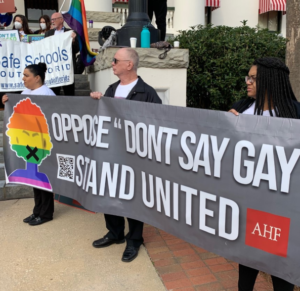
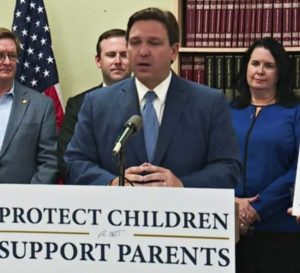
Opposition Grows Against Florida’s Don’t Say Gay Law
In April, Florida Gov. Ron DeSantis signed into law the Parental Rights in Education bill, known as the “Don’t Say Gay” law.
The bill bans instruction or classroom discussion about LGBTQ issues in kindergarten through third grade. Older students may discuss gay and transgender issues if they are “age appropriate or developmentally appropriate.” Florida’s legislators believe that classroom education about sexual orientation and gender shouldn’t start at an early age, and that parents can have the final say about what their children learn and when.
Sex education has already been banned in Florida and many other states until the fifth grade. Critics contend the new law focuses on a problem that doesn’t exist for the state’s youngest students. By limiting discussions about LGBTQ issues, it could stifle conversations for kids who need to process their own gender or sexual-identity questions, they say.
Many school librarians have accused their schools of removing race- and LGBTQ-related books from their shelves to avoid a fight. The Washington Post reported that schools with small budgets cannot afford to contest court challenges that the law will surely draw. Some schools are reportedly peeling off rainbow safe-space stickers from windows. As with other restrictive laws, the chilling effect is already being seen in schools across the nation.
Joining us today is K&L Gates attorney Michael Komo – a triple alumnus of George Washington University. Michael is well known for his work on behalf of the LGBTQ community and has been recognized at the local, state, and federal level, with accolades including Pittsburgh Magazine’s 2021 40 under 40 honorees and City and State PA’s 2022 Pride Power 100 honorees. He co-founded the LGBTQIA+ Anti-Human Trafficking Initiative with the FBI, started the Pride Night Series for Pittsburgh’s professional sports teams, and serves as the chair of the LGBT Rights Committee of the Allegheny County Bar Association.
Guest – attorney Michael Komo is well known for his work on behalf of the LGBTQ community, with accolades including Pittsburgh Magazine’s 2021 40 under 40 honorees. He co-founded the LGBTQIA+ Anti-Human Trafficking Initiative with the FBI, started the Pride Night Series for Pittsburgh’s professional sports teams, and serves as the chair of the LGBT Rights Committee of the Allegheny County Bar Association.
—-
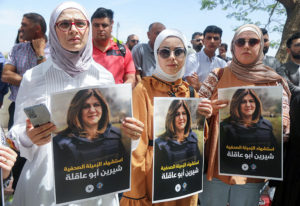
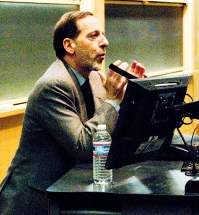
Investigating The Assassination Of Palestinian American Journalist Shireen Abu Aqleh
The Zionist colonial settler state of Israel is not the moral legatee of the victims of the Holocaust much less the moral legatee of the ancient prophets of the Jewish people.
Never has this been more evident than last month with the exposure of the Israeli army’s assassination of the beloved Palestinian American journalist Shireen Abu Aqleh. Assassination is a political murder.
Shireen had covered the Israeli military’s occupation of the West Bank for Al Jazeera for 25 years. The day she was killed she was reporting on the Israeli military invasion of Jenin, an Arab town on the West Bank occupied by the Israeli army for 55 years. She was wearing a helmet and a protective vest marked “PRESS.”
It is the practice of the Israeli army to shoot journalists and otherwise suppress the truth of their war crimes including the illegal theft of Palestinian lands. Israel’s brutal occupation has been going on since it illegally seized the West Bank as a prize of the 1967 war between Israel and three of its neighbors. Since then the Israeli military has ruled the native Arabs. Shireen is the 86th journalist to be killed while covering Israel’s illegal occupation since 1967.
The murder of Shireen was not adequately exposed by the U.S. press. The United States supports Israel politically, ideologically, economically, and morally. The U.S. gives the state of Israel more than $3.8 billion a year in weapons. Shireen was killed by a high-velocity armor-piercing 5.56 mm bullet fired from a Ruger Mini-14 semi automatic rifle – a weapon made in the U.S.
Israel has refused to conduct an investigation of Shireen’s assassination, because it “would provoke opposition and controversy within the IDF [Israeli Defense Force] and in Israeli society in general,” according to the Israeli government. Although complaints have been filed in the International Criminal Court against Israel, the court does not appear to have the political will to thoroughly investigate those charges.
There is an apocryphal story of three rabbis dispatched from a Zionist congress in Vienna many years ago to report back on the situation in Palestine. They reported back that the bride is beautiful but she’s married to another man.
The claim of the Zionist is that Israel was built on a land without a people for a people without a land. This is Israeli propaganda. This propaganda is less and less swallowed by the new generations in the United States and Europe as they witness Israel taking over more and more of historic Palestine and attempting to prevent the truth of what they are doing from coming out.
Guest – Columbia University Professor Rashid Khalidi is a Palestinian American historian of the Middle East, the Edward Said professor of Modern Arab Studies at Columbia University, and Director of the Middle East Institute of Columbia School of International and Public Affairs. He was educated at Yale and Oxford universities and is the author of many books on the Middle East. He is also the author of Under Siege: PLO Decision Making During the 1982 War, Brokers of Deceit: How the US Has Undermined Peace in the Middle East and recently The Hundred Years’ War on Palestine: A History of Settler Colonialism and Resistance, 1917–2017.

—————————————–
Animal Rights, Civil Liberties, Civil Rights, Human Rights
Podcast: Play in new window | Download
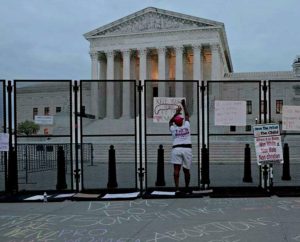

Supreme Court Justice Samuel Alito’s Leaked Draft Opinion
In 1973, the Supreme Court held in Roe v. Wade that the Constitution protects a woman’s right to abortion until the fetus becomes viable, that is, when it can survive outside the womb (which is about 23 weeks of pregnancy). Nearly 20 years later in Planned Parenthood v. Casey, the Court reaffirmed the central holding of Roe and said restrictions that placed an “undue burden” on a woman’s right to abortion were unconstitutional.
In perhaps the most significant leak in the history of the Supreme Court, Politico published a draft opinion that Samuel Alito wrote in Dobbs v. Jackson Women’s Health Organization, which would overturn Roe and Casey. At least four other members of the Court would have to sign Alito’s draft in order to overrule the constitutional right to abortion.
But Politico also reported that, in a straw poll following oral argument in December, Clarence Thomas, Neil Gorsuch, Brett Kavanaugh and Amy Coney Barrett voted to overrule Roe, Casey and the constitutional right to abortion, and they all continue to hold that position. The Court will issue its final opinion in Dobbs by the end of June.
Although two-thirds of the American people believe that Roe should not be overturned, it appears that the Supreme Court is poised to do just that. Moreover, if the Court says that abortion is not a constitutional right, many other so-called “unenumerated rights” that are not specifically mentioned in the Constitution will also be in jeopardy.
Guest – Erwin Chemerinsky, Dean of Berkeley Law School. Dean Chemerinsky is one of the nation’s preeminent constitutional scholars. He has written 14 books, including leading casebooks and treatises about constitutional law, criminal procedure, and federal jurisdiction. He also represents clients and has argued several times before the Supreme Court.
—-

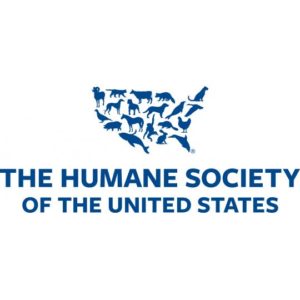
Government Agencies Delay Food Safety FOIA Requests Part 2
The US Freedom of Information Act is a 1967 federal law requiring federal agencies to disclose information to the public. The logic being: “a government of, by and for the people, is transparent and accountable to those people.” In the last half-century, FOIA requests have became critical tools for both journalists and activists seeking to illuminate federal agency activities.
However, since 2014 it’s gotten harder to wrest information from recalcitrant government agencies. Federal agencies began both heavily redacting information, or ignoring requests entirely. Delays have also been noticeably lengthier. The law gives agencies 20 business days to respond. Yet by 2019, the average wait time for a reply to your FOIA request was nearly six months (177 days).
Today’s guest experienced this frustrating process— waiting seven years for the US Fish and Wildlife service to respond. He filed his FOIA in 2014, receiving nothing for ten months, and finally a reply with much the data blacked out. This forced him to sue.
Guest – Attorney Nicholas Arrivo, managing attorney and champion of endangered species at Humane Society of the U.S.

————————
Animal Rights, Civil Liberties, Civil Rights, Human Rights
Podcast: Play in new window | Download
Michael Smith Editorial On Kathy Boudin
—-


Landmark Case Roe v. Wade Analysis
In headline news, on May 3 a leaked draft Supreme Court opinion was published in Politico. Samuel Alito’s draft decision in Dobbs v. Jackson Women’s Health Organization would overrule the landmark cases of Roe v. Wade and Planned Parenthood v. Casey. Alito writes that abortion is no longer a constitutional right and he leaves it up to the states to enact and enforce laws restricting a woman’s right to choose.
Alito wrote that “Roe and Casey must be overruled,” finding no constitutional right to abortion. If four more conservative members of the Supreme Court agree — which Clarence Thomas, Neil Gorsuch, Brett Kavanaugh and Amy Coney Barrett reportedly do at the present time—all reproductive and privacy rights will be imperiled.
If the court overrules Roe, it’s expected that half the states will outlaw or severely limit abortion. Thirteen states with so-called “trigger laws” would immediately ban the procedure. Five states that have pre-Roe abortion bans could once again enforce them. And 14 states would ban abortions before fetal viability.
Prohibition of and restrictions on abortion would disproportionately affect poor women and people of color. People suffering early miscarriages or ectopic pregnancies could be adversely affected if Roe is overturned. Fertility procedures such as in-vitro fertilization, egg extractions and stem cell procedures could be outlawed. Other “unenumerated” rights not specifically mentioned in the Constitution would be jeopardized. They include the right to travel, the right to vote and the right to interracial marriage.
Guest – Attorney Marjorie Cohn – Professor emerita at Thomas Jefferson School of Law where she taught from 1991-2016, a former criminal defense attorney, and past president of the National Lawyers Guild. She lectures, writes, and provides commentary for local, regional, national and international media. On May 6, Marjorie published an article on Truthout titled: Will Demise of “Roe” Be a Death Knell for Contraception, Marriage Rights?
—-


Government Agencies Delay Food Safety FOIA Requests
The US Freedom of Information Act is a 1967 federal law requiring federal agencies to disclose information to the public. The logic being: “a government of, by and for the people, is transparent and accountable to those people.” Getting the act passed was a democratic victory of the movement in the 60s. Over the last half-century, FOIA requests became critical tools for both journalists and activists seeking to illuminate federal agency activities.
The problem is– it’s getting harder to wrest information from recalcitrant government agencies. Federal agencies began both heavily redacting information, or ignoring requests entirely. And delays got noticeably lengthier. The law gives agencies 20 business days to respond. But in 2019, the average wait time for a reply to your FOIA request was nearly six months (177 days).
This forces public safety groups to begin expensive and lengthy lawsuits to get data that’s rightfully ours. Today’s guest has experienced this frustrating process—first requesting information; then waiting years for respective agencies to respond; receiving either no reply or replies with much the data blacked out; and finally, being forced to sue.
Guest – Zach Corrigan, is a champion of food safety and senior attorney at Food and Water Watch. Back in 2018, Mr. Corrigan became concerned when Trump both removed 40% of the federal inspectors and allowed for faster slaughter lines in our nation’s hog slaughterhouses. Letting hog slaughterhouses regulate themselves makes foodborne illness nearly inevitable, because Trump’s new rules precluded adequate safety testing. COVID itself should have taught us that human health is inexorably linked to the health of all other animals and the environment. Yet even the Biden administration is pandering to the meat industry by deregulating it.

———————————–
Civil Liberties, Civil Rights, Human Rights, Violations of U.S. and International Law
Podcast: Play in new window | Download
- Roe v. Wade Editorial by Attorney Jim Lafferty
—-

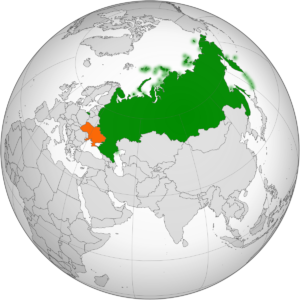
Paralysis In The US Antiwar Movement
The proxy war between the United States and Russia has been going on in Ukraine, according to some, since February. Others argue it’s been happening since 2014 with the U.S.-organized coup which overthrew the elected government of Ukraine and replaced it with a government more favorable to U.S. interests.
The corporate news media in the United States have downplayed the U.S. role in the 2014 coup, which brought fascists into a European country‘s government for the first time since World War II. At that point, the coup government launched a military action against the Russian speaking population of the eastern Donbas region which had declared its independence by a popular vote. This military action by Ukrainian forces resulted in 14,000 deaths.
It is the position of many antiwar activists in the United States that Russia initiated a war of aggression by invading Ukraine this past February. Other antiwar activists say that Russia acted in self-defense, considering what happened in 2014, the expansion of NATO and military bases up to Russia’s borders; they have refused to outright condemn the Russian invasion.
This disagreement has caused a paralysis in the U.S. peace movement. Moreover, the United States has supplied the Ukrainian government with billions of dollars worth of weapons and has demonstrated no inclination to support a cease-fire or a negotiated settlement.
Some have observed that the United States will fight the Russians to the last drop of Ukrainian blood.
The danger of a nuclear conflagration between the United States and Russia, the world’s two most heavily nuclear armed countries, increases daily. The United States has now articulated its goal in the war: to subjugate the Russians and overthrow the Putin government.
For its part, the Ukrainian government is under tremendous pressure from right-wing forces in the country (the same forces that participated with rifle fire in the 2014 coup) to refrain from engaging in peace discussions. The Ukrainian government is operating under martial law and has banned all opposition parties, including socialists and those advocating for negotiations and peace. Repression in Ukraine is being carried out by the SUB, the Ukraine political police, with advice from the CIA.
What will it take to mobilize antiwar Americans so they act together in a unified way? What demands should they raise?
Guest – Medea Benjamin is the co-founder of the women-led peace group CODEPINK and the co-founder of the human rights group Global Exchange. She serves on the CODEPINK Board of Directors and has been an advocate for social justice for more than 40 years. Described as “one of America’s most committed — and most effective — fighters for human rights” by New York Newsday, and “one of the high profile leaders of the peace movement” by the Los Angeles Times, she was one of 1,000 exemplary women from 140 countries nominated to receive the Nobel Peace Prize on behalf of the millions of women who do the essential work of peace worldwide.
—-


Free Speech And Censorship In The United States
We are taught from a very young age that one of the many blessings of living in an open and democratic nation is that we all have the right to say publicly what is on our mind; that free speech is one of the great hallmarks of our democracy. And yet, throughout our nation’s history there have been periods of time when the constitutional guaranty of free speech has been under serious assault. And this is one of those times. Less than 50% of students, as well as all other American adults, feel the right of free speech is fully secure in the United States today. And I’m afraid they are correct.
In recent years a number of public opinion surveys have disclosed that a goodly number of Americans believe people with hateful or very controversial views that might unduly excite people, or insult people, should not be allowed to express those views in the public arena. And this is true of both liberals and conservatives. At least one in four college students think it’s fine to ban highly controversial speakers from their college campus and, in fact, one in six students believe that if all else fails, they can resort to physical intervention to prevent them from speaking on campus.
Well, as the old adage about it not being legally permissible to shout “fire” in a crowded movie theater, what are the limits on free speech today? Should racist speech be allowed? How about misogynous speech? Or pro-Palestinian and anti-Israel speech? Does the fact that our nation is very divided, very tribal today, inform the answers to such questions? Well, we’ve a lot to cover today. Let’s get started.
Guest – Attorney Nadine Strossen is the New York Law School’s John Marshall ll Professor of Law, Emerita. From 1991-2008 she served as the president of the American Civil Liberties Union, the first woman to do so. When she stepped down as ACLU president in 2008, three US Supreme Court Justices participated in her farewell and tribute luncheon: Ruth Bader Ginsburg, David Souter and Antonin Scalia. Her 2018 book, is “HATE: Why We Should Resist It With Free Speech, Not Censorship,” and her earlier book, “Defending Pornography: Free Speech, Sex, and the Fight for Women’s Rights,” was named a “notable book of 1995 by the New York Times.

—————————
genocide, Human Rights, Torture, Violations of U.S. and International Law
Podcast: Play in new window | Download
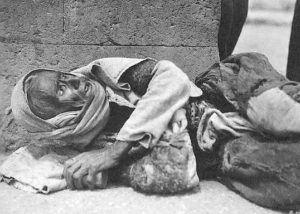
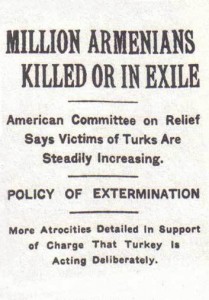
Radio Documentary – It Was Genocide: Armenian Survivor Stories
Around the world, April 24 marks the observance of the Armenian Genocide. On that day in 1915 the Interior Minister of the Ottoman Empire ordered the arrest and hangings of Armenian intellectuals and community leaders in Constantinople. It was the beginning of a systematic and well-documented plan to eliminate the Armenians, who were Christian, and who had been under Ottoman rule and treated as second class citizens since the 15th century.
The unspeakable and gruesome nature of the killings—beheadings of groups of babies, dismemberments, mass burnings, mass drownings, use of toxic gas, lethal injections of morphine or injections with the blood of typhoid fever patients—render oral histories particularly difficult for survivors of the victims.
Why did this happen? Despite being deemed inferior to Turkish Muslims, the Armenian community had attained a prestigious position in the Ottoman Empire and the central authorities there grew apprehensive of their power and longing for a homeland. The concerted plan of deportation and extermination was effected, in large part, because World War I demanded the involvement and concern of potential allied countries. As the writer Grigoris Balakian wrote, the war provided the Turkish government “their sole opportunity, one unprecedented” to exploit the chaos of war in order to carry out their extermination plan.
As Armenians escaped to several countries, including the United States, a number came to New Britain, Connecticut in 1892 to work in the factories of what was then known as the hardware capital of the world. By 1940 nearly 3,000 Armenians lived there in a tight-knit community.
Pope Frances calls it a duty not to forget “the senseless slaughter” of an estimated one and a half million Armenians by the Ottoman Turks from 1915 to 1923. “Concealing or denying evil is like allowing a wound to keep bleeding without bandaging it,” the Pope said just two weeks before the 100th anniversary of the systematic implementation of a plan to exterminate the Armenian race.
Special thanks to Jennie Garabedian, Arthur Sheverdian, Ruth Swisher, Harry Mazadoorian, and Roxie Maljanian. Produced and written by Heidi Boghosian and Geoff Brady.
—-
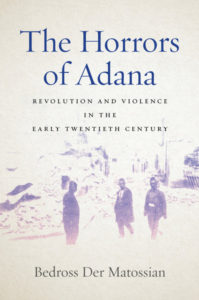
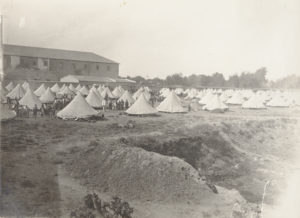
Horrors Of Adana by Bedross Der Matossian
In April 1909, a few years before the 1914 Ottoman massacre of Armenians, two massacres killed more than 20,000 Christians, primarily Armenians. They transpired in Adana, situated on the Mediterranean cost of southern Anatolia. Images of the area after the attacks show unprecedented destruction of a formerly prosperous city. Armenian churches, businesses, and homes were destroyed, and the violence quickly spread across the province and extended outside its eastern borders into the province of Aleppo.
Despite the magnitude of these devastating atrocities, no one was held accountable. In fact, they have have remained largely absent from history books. But that’s about to change.
Guest – Bedross Der Matossian has written a meticulously-researched examination of these events. It’s called The Horrors of Adana: Revolution and Violence in the Early Twentieth Century, and it’s published by Stanford University Press. It’s a detailed exploration of the twin massacres and the events and the economic and sociopolitical transformations leading up to them. He is Associate Professor at the University of Nebraska, Lincoln, and the president of the Society for Armenian Studies. He is the author and co-editor of several books including the award-winning book, Shattered Dreams of Revolution: From Liberty to Violence in the Late Ottoman Empire.

——————————-



















